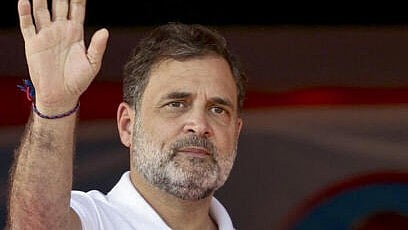
LoP in the Lok Sabha and Congress leader Rahul Gandhi
Credit: PTI Photo
New Delhi: The Supreme Court on Thursday extended till December 4 its interim order staying proceedings against Congress leader Rahul Gandhi in a case related to his alleged derogatory remarks against the Indian Army during his 2022 Bharat Jodo Yatra.
A bench of Justices M M Sundresh and Satish Chandra Sharma deferred the hearing in the matter, noting there was a letter circulated for adjournment.
The bench was hearing Gandhi's plea challenging a May 29 order of the Allahabad High Court dismissing his plea challenging the trial court's summoning order in the case.
While hearing Gandhi's plea on August 4, the top court stayed till the next date of hearing further proceedings in the case pending before a court in Lucknow.
"How do you get to know that 2,000 sq km of Indian territory has been occupied by Chinese? Were you there? Do you have any credible material?" the bench had earlier asked Gandhi about his alleged remarks.
"Why do you make these statements without having any material? If you are a true Indian, you won't say such a thing," it added.
The top court had then issued notice to the Uttar Pradesh government and the complainant in the case seeking their responses on Gandhi's plea.
Senior advocate Abhishek Singhvi, appearing for Gandhi, had told the apex court that it would be an unfortunate situation if the Leader of Opposition cannot raise issues. He referred to Section 223 of the Bharatiya Nagarik Suraksha Sanhita, and said prior hearing of the accused was mandatory before the court took cognisance of a criminal complaint, which was not done in the present case.
In his plea filed in a court, complainant Udai Shanker Srivastava alleged that Gandhi made several derogatory remarks against the Indian Army in context of the clashes with Chinese soldiers during his December 2022 yatra.
The trial court summoned Gandhi as an accused for facing trial for the alleged offence of defamation. Gandhi's advocate Pranshu Agarwal argued that the allegations appeared to be fabricated, just by reading the complaint.
It was also argued that Gandhi is not a resident of Lucknow. So the trial court should have investigated the veracity of the allegations before summoning him on this complaint, and he should have been summoned only if the allegations were prima facie found to be fit for trial.